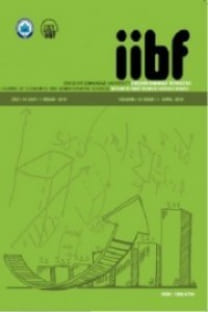Türkiye'nin Antidamping Soruşturmalarını Etkileyen Faktörler: Sanayi Verileri ile Ekonometrik Bir Analiz
Bu çalışmada yerel sanayiye ait üretim ve ithalatverileri ile Türkiyedeki antidamping soruşturmasayısını etkileyen faktörler analiz edilmiştir. Yerelsanayinin toplam istihdamı, üretim miktarlarındaki ve ürettikleri ürünlerin ithalatındaki yüzdelik değişiklik açıklayıcı değişken olarak kullanılarak tahmin edilen Negatif Binomial Regresyonsonuçlarına göre yerel sanayilerin büyüklüğü,üretimlerindeki azalma ve iç piyasada ithalattandolayı artan rekabetin soruşturma sayılarınıarttırdığı bulunmuştur. Bu bulgular yerel sanayilerin mali gücü ve lobicilik yetisinin, ayrıca uluslarası rekabet edebilme gücü ve ekonomikperformasının antidamping uygulamaları açısından önemini ortaya koymaktadır.
Factors affecting Turkey s Antidumping Peti- tions: An Econometric Analysis using Industry Data
This study analyzes the factors that affects thenumber of antidumping investigations in Turkeyusing production and import database of domestic industries. Negative Binomial Regressionestimates in which the regressors are totalemployment, output and import growth ofdomestic industries show that the size of thedomestic industry, a fall in output and an increase in the imports increase the number offilings. This findings points the importance of thefinancial and lobbying power of industries, theability to compete internationally and the economic performance on antidumping practices.
___
- Aggarwal, A., (2004), Patterns and Determinants of Anti-Dumping: A Worldwide Perspective. World Development, 32(6), 1043-1057.
- Avsar V. (2013), Antidumping, Retaliation threats and Export Prices, World Bank Economic Review, 27(1), 133-148.
- Avsar. (2013), Trade effects of Turkeys Antidumping Duties, Uludağ Üniversitesi İİBF Dergisi, baskıda.
- Belderbos, R. (1997), Antidumping and Tariff Jumping: Japanese Firms DFI in the European Union and the United States. Review of World Economics, 133 (3), 419- 45.
- Bown, C. P. (2008), The WTO and antidumping in developing countries. Economics & Politics, 20(2), 255-288. (Erişim: 23.07.2013).
- Bown, C. (2012), Global Antidumping Database. Washington, DC: http://econ.worldbank.org/ttbd/gad.
- Dişbudak, C. ve K. Türkcan (2005), Antidamping Uygulamalarının Ekonometrik Analizi: Türkiye Örneği. Iktisat Isletme ve Finans, 20(233), 149-164.
- Feinberg, R. ve K. Reynolds (2006), The Spread of Antidumping Regimes and the Role of Retaliation in Filings. Southern Economic Journal, 72 (4), 877-90.
- Ganguli, B. (2008), The Trade Effects of Indian Antidumping Actions. Review of International Economics 16(5), 930-94.
- Knetter, M.. ve T. J. Prusa, (2003), Macroeconomic Factors and Antidumping Filings: Evidence from Four Countries. Journal of International Economics, 61, 1- 17.
- Konings, J., ve H. Vandenbussche. (2005), "Antidumping protection and markups of domestic firms." Journal of International Economics, 65(1), 151-165.
- Lasagni, A. (2000), Does Country-Targeted Antidumping Policy by the EU Create Trade Diversion, Journal of World Trade 34(4), 137-159.
- Malhotra N., ve H. Rus. (2009), The Effectiveness of the Canadian Antidumping Regime. Canadian Public Policy 35(2), 187-202
- Prusa T. (2001), On the Spread and Impact of Antidumping. Canadian Journal of Economics 34 (3), 591-611.
- Staiger, R. ve F. Wolak. (1994), Measuring Industry Specific Protection: Antidum- ping in the United States, Microeconomics, 1994, 51-103.
- Zanardi, M. ve M. Moore (2011), " Trade Liberalization and Antidumping: Is There a Substitution Effect?," Review of Development Economics, 15(4), 601-619.
- ISSN: 1306-6730
- Yayın Aralığı: Yılda 3 Sayı
- Başlangıç: 2006
- Yayıncı: Eskişehir Osmangazi Üniversitesi İktisadi ve İdari Bilimler Fakültesi
Sayıdaki Diğer Makaleler
Vesile Ayça YAMUÇ, Duygu TÜRKER
Türkiye'nin Darbe Geleneği: 1960 ve 1971 Müdahaleleri
Erdinç KARADENİZ, Selda KAHİLOĞULLARI
Erdinç KARADENİZ, Selda KAHİLOĞULLARI
Destek Vektör Makineleriyle Sınıflandırma Problemlerinin Çözümü İçin Çekirdek Fonksiyonu Seçimi
Kamu Açıkları, İç Borç ve Faiz Oranı İlişkisi: Türkiye Örneği
Kamu Açıkları İç Borç ve Faiz Oranı İlişkisi: Türkiye Örneği
Türkiye ve Üye Ülkelerin AB-2020 Stratejisi Göstergeleri Açısından Kümelenmesi
Sibel Mehter AYKIN, Adil KORKMAZ
Neo-liberal Küreselleşme Çağında ‘Hegemonya’ yı Yeniden Yapılandırmak
